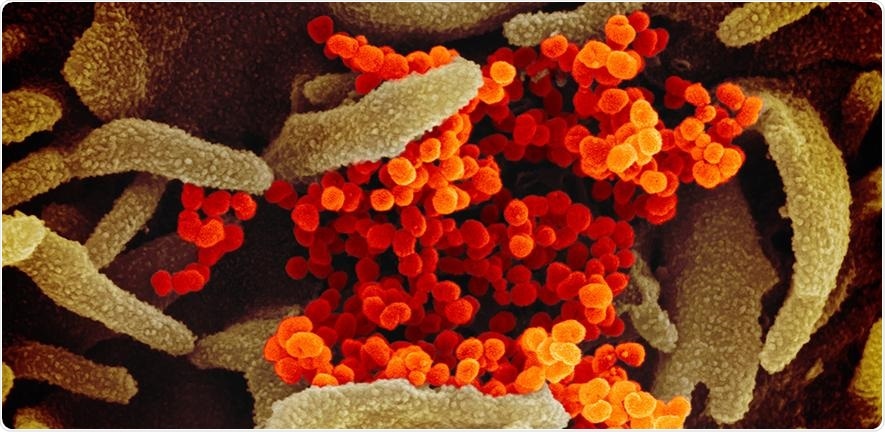Scientists have come up with a new method to treat SARS-CoV-2 infection by fixing the cell damage instead of fighting the virus directly. This method has been found to be effective against SARS-CoV-2 in laboratory models. And if this anti-viral therapy proves to be safe for human use, it would make COVID-19 symptoms milder and accelerate the recovery times.

Scanning electron microscope image of SARS-CoV-2 (orange) emerging from the surface of cells (green) cultured in the lab. Image Credit: NIAID.
SARS-CoV-2, the causative agent of COVID-19, invades the cells of an infected person and uses them to replicate. The cells experience stress due to this process. Existing approaches for treating the infection targets the virus with antiviral drugs. However, scientists from the University of Cambridge shifted their focus on the body’s cellular response to the virus.
In a recent study, the researchers found that all three branches of a three-pronged signaling pathway, known as the “unfolded protein response” (UPR) are stimulated in lab-grown cells infected with the SARS-CoV-2 virus. Using drugs to inhibit the UPR in restoring normal cell function was also found to considerably reduce the replication of the virus. The study was recently published in the PLOS Pathogens journal.
The virus that causes COVID-19 activates a response in our cells—called the UPR—that enables it to replicate. Using drugs we were able to reverse the activation of this specific cellular pathway, and remarkably this reduced virus production inside the cells almost completely, which means the infection could not spread to other cells. This has exciting potential as an anti-viral strategy against SARS-CoV-2.”
Dr Nerea Irigoyen, Study Senior Author, Department of Pathology, University of Cambridge
Treating with a single drug that targets one prong of the UPR pathway had affected viral replication to some extent. But a combination of two drugs, such as KIRA8 and Ceapin-A7 that simultaneously target two prongs of the UPR pathway, reduced the virus production in the cells by as much as 99.5%.
This study is the first of its kind to demonstrate that the combination of two drugs has a relatively greater effect on virus replication in cells when compared to a single drug. While this approach may not prevent a person from getting infected, the symptoms would be much milder and the recovery time would be quicker, claimed the researchers.
Currently used anti-viral drugs, like remdesivir, targets viral replication. However, if the virus develops resistance to these drugs, it would no longer work. On the other hand, the new treatment approach targets the response of the infected cells, and hence, this will not alter even if a new variant emerges. This is because the virus needs a cellular response to replicate.
The subsequent step was to test the approach in mouse models. The researchers also wanted to determine if the new approach works against other viruses and diseases, like neurological disorders and pulmonary fibrosis, that also stimulate the UPR response in cells.
We hope this discovery will enable the development of a broad-spectrum anti-viral drug, effective in treating infections with other viruses as well as SARS-CoV-2. We’ve already found it has an effect on Zika virus too. It has the potential to have a huge impact.”
Dr Nerea Irigoyen, Study Senior Author, Department of Pathology, University of Cambridge
The novel virus responsible for the COVID-19 pandemic is the SARS-CoV-2 coronavirus. There are more than 150 million cases of the disease across the world, and more than three million people have died since the end of 2019.
Source:
Journal reference:
Echavarria-Consuegra, L., et al. (2021) Manipulation of the unfolded protein response: a pharmacological strategy against coronavirus infection. PLOS Pathogens. doi.org/10.1371/journal.ppat.1009644.